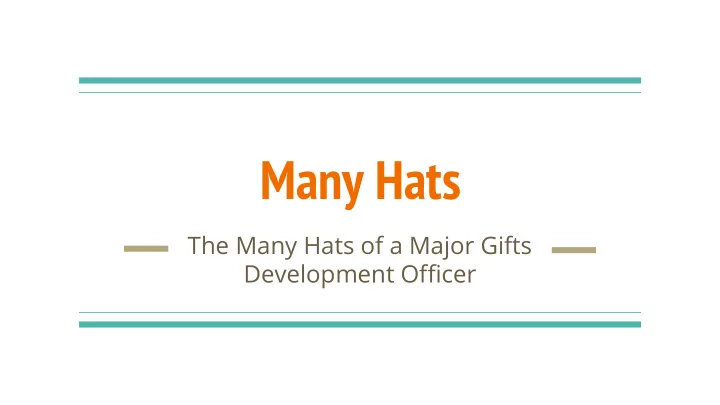

Many Hats The Many Hats of a Major Gifts Development Officer
Introduction
Why fundraising? "For small creatures such as we the vastness is bearable only through love." -Carl Sagan
The Big Gift
The Big Gift 2 year, 8 month solicitation period ● $1M+ Ask ● Family Foundation ● Funding criteria evolved to be highly specific ● 1st proposal was capital oriented, more generic. ● 2nd proposal was research oriented, highly customized. ● = Lots of emails!
The Big Gift: How did I spend my time?
The Big Gift: How did I spend my time?
The Big Gift: How did I spend my time?
The Big Gift: Implications Big gifts in large institutions are often like this. ● Should fundraisers be spending a lot of time on this? (Probably not!) ● We need two things: A standardized, strategic approach for setting philanthropic priorities in ● big institutions. Better skill development for fundraisers to manage proposal ● development.
Project Management for Winning Proposals
“A temporary organization that is needed to produce a unique and predefined outcome or result at a pre-specified time using predetermined resources.” -PRINCE2 Manual
Proposal Development is a Project! Temporary Organization:The programmatic experts you need to develop a project. Predefined Outcome: A proposal. Prespecified Time: When the donor wants the proposal Predefined Resources: Writer/Designer
Insights from Project Management: Team Building Researcher Operations Finance Researcher’s Boss
Insights from Project Management: Reward Power Formal: This power is based on the position of the development officer. Penalty (Coercive): This power comes from the ability to penalize team members. Expert: This power comes from being the technical expert or even the project management expert. Referent: Referent is the power of charisma and fame. This power comes from another person liking the project manager, respecting him, or wanting to be like him. Reward: This power stems from giving rewards. ( -Project Management Institute)
Insights from Project Management: Stakeholder Management Donor Senior Your Boss Leadership Mid-Level Leadership Implementing Team
Negotiations in Proposal Development
Insights from Negotiations Theory: ZOPA What we need to find Things (aligned with priorities, that are of interest to donors) difficult to “sell” Projects that What we need What Donors might be a bit money for want to fund tangential to immediate priorities Zone of Possible Agreement (ZOPA)
Insights from Negotiations Theory: Why is Zopa important? How detailed is the reporting which Researcher Will I have enough your donor is $ to pay my staff? expecting? Can I pay myself? Operations Will this project Finance Does our gift be aligned with include enough our strategy? overhead? Researcher’s Boss
In summary: It is easy to get this wrong What we need money for
Proposal Development: Tips for Success
Proposal Development: Tips for Success Don’t get caught up in your own hype machine!
Proposal Development: Tips for Success (Understand your institutional context)
Proposal Development: Tips for Success (Understand your institutional context)
Proposal Development: Tips for Success Don’t Over-Promise
Proposal Development: Tips for Success Be Collaborative
Proposal Development: Tips for Success Don’t be afraid to ask questions!
Proposal Development: Tips for Success Always leave a paper trail.
Questions and Answers Udai Srinivasan, MBA Senior Development Officer CAMH Foundation udai.srinivasan@camh.ca
Recommend
More recommend